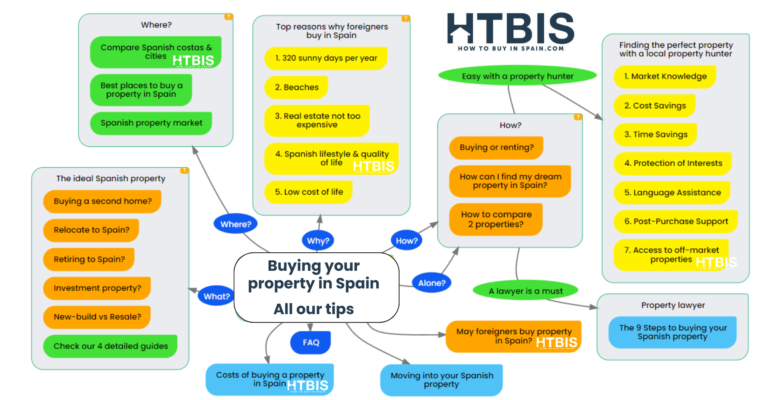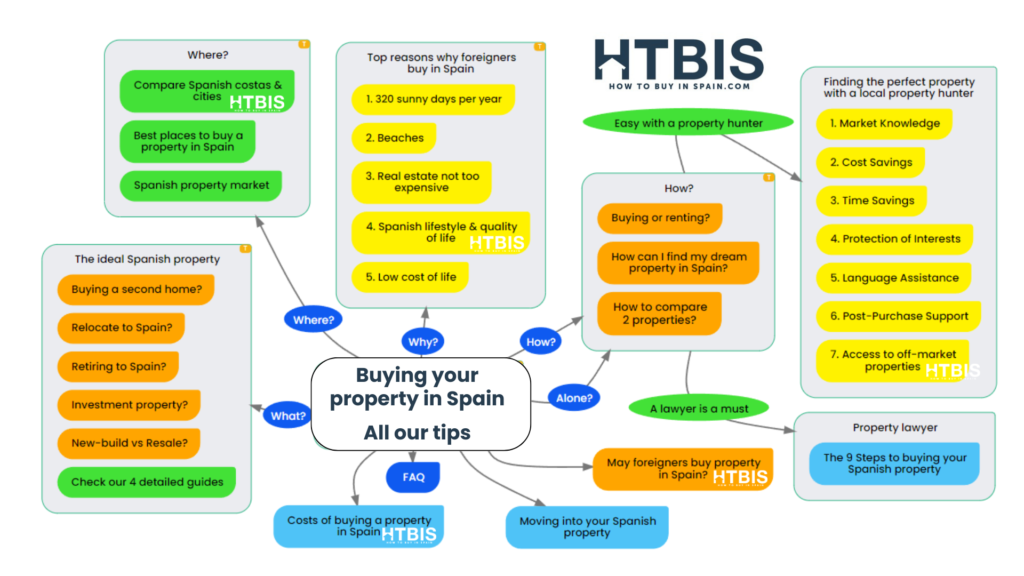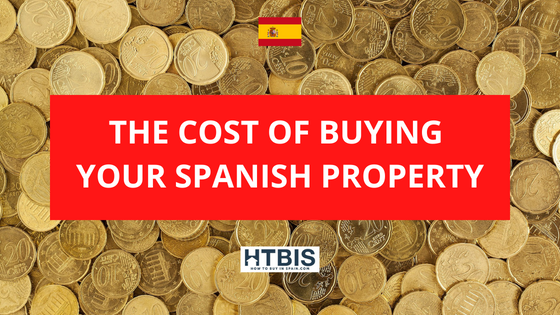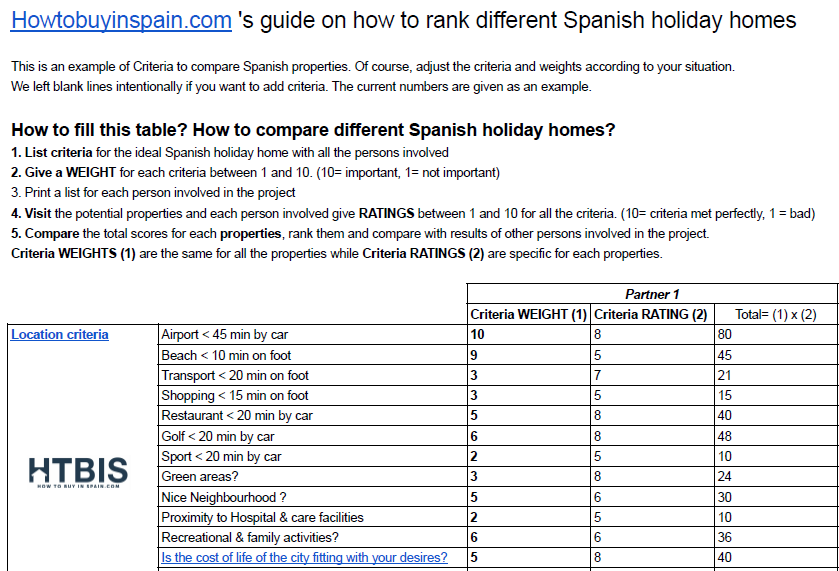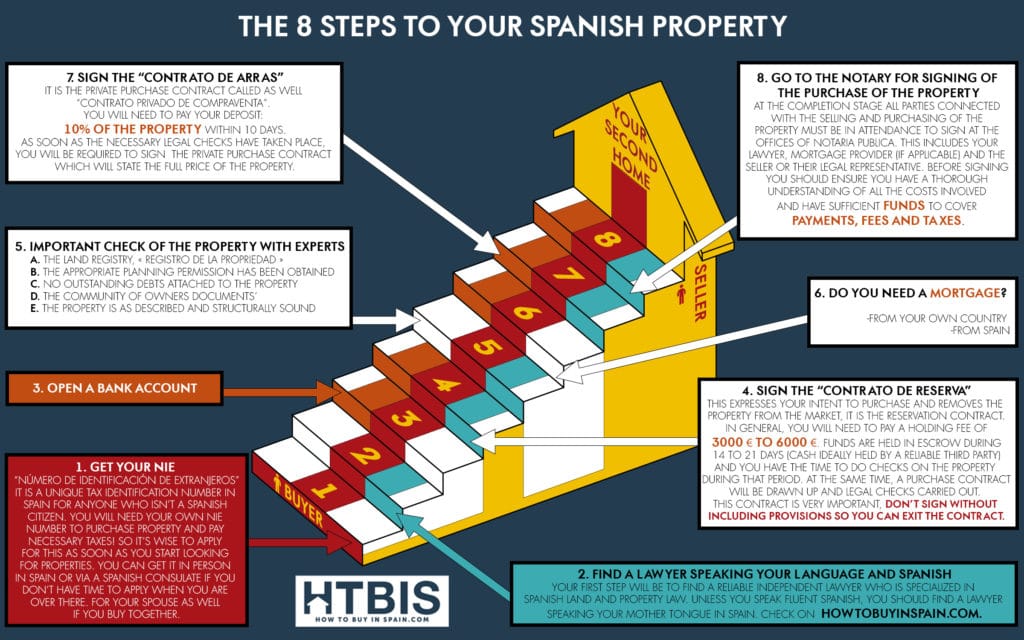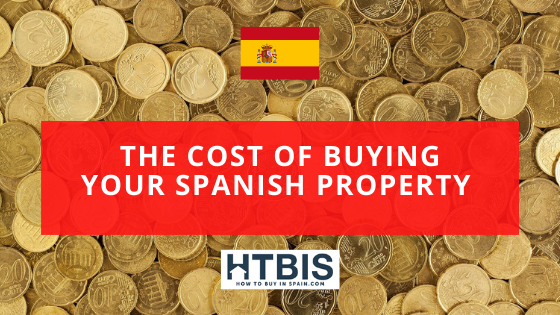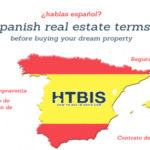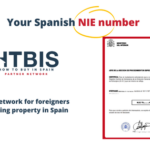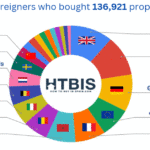 Reading time 9 minutes. Use our table of content for a quick read.
Reading time 9 minutes. Use our table of content for a quick read.
Last Updated on 11/06/2025 by STEPHANE
Click on any flag to get an automatic translation from Google Translate. Some news could have an original translation here: News Nouvelles Nieuws Noticias Nachrichten
Buying property in Spain is very easy
Spain is the number one destination for tourists in Europe. So, not a surprise that many foreigners decide to buy property there.
Buying a property in Spain is not too difficult: you can do it alone, but it is strongly advised to work at least with a local real estate lawyer. Of course, local professionals like local property hunters are nice to have.
Before starting our full review on how to buy your Spanish property, we give you three easy-to-use summaries on the subject:
- Our downloadable step-by-step infographic with all the issues we will cover
- Our summary of the key insights you will learn in this article
- Our 2-minute video on the subject (if you are on the go)
Our downloadable step-by-step guide on how to buy your property in Spain
Too busy? Here is our quick-read summary and our 2-minute video:
How to buy a property in Spain? Our key insights
- Eligibility for foreigners: Expats can buy property in Spain. It’s advisable to consult a legal professional throughout the process to ensure compliance with Spanish laws. For certain foreigners, a Golden Visa is available to facilitate living in Spain.
- Cost of Property: The cost of buying property in Spain averages at about 15% of the property’s value, which includes taxes.
- Best Places to Buy: Choice of location depends on personal preference and intended use of property. Popular regions include Andalusia, the Valencian Community, Catalonia, and the Balearic and Canary Islands.
- Spanish Property Market: The Spanish property market has seen a recovery in recent years. By early 2024, property prices in Spain averaged €1.835 per square meter.
- Homeownership Vs Renting: Deciding between buying or renting in Spain involves considering income level, interest rates, rental prices and the general economic situation. Each individual’s circumstances will determine the best choice.
- Finding Property: Several resources are available to aid in finding the ideal property in Spain. These include guides on starting a Spanish property search, determining the best places to buy, and checklists for different buyer profiles.
- Working with a Property Hunter: A local property hunter can offer expertise, negotiate the best deal, save time, protect buyer’s interests, assist with language barriers, and provide post-purchase support.
- Legal Adviser: It’s advisable to work with a real estate lawyer to ensure the property purchase is watertight and avoid potential issues.
- New-Build Homes: Spain offers advantages for those looking to purchase a new-build home. Abundant plots, high-quality materials, and affordable labor costs are some benefits.
Buying property in Spain, our 2-minute video
Would you like to watch this video in your own language? Click at the bottom right of the video on “cc” to get subtitles in your language.
After this quick introduction, let’s give you all our useful resources on how you should buy your property in Spain to enjoy a nice and safe journey.
#1 May foreigners buy property in Spain?
Yes, foreigners and expats may property in Spain. Spain welcomes foreign buyers, including expatriates, who are interested in purchasing property within the country. There are no specific restrictions or limitations on property ownership for expats in Spain. However, it is advisable to seek professional legal advice and guidance throughout the purchasing process to ensure compliance with Spanish laws and regulations.
For some countries, it is more tricky to buy and/or stay in Spain for a long period of time. The good news is that Spain has created a Golden Visa for foreigners looking to invest in Spain. Don’t miss our detailed article for more on that subject: Golden Visa in Spain: Your ultimate guide!
#2 What are the costs of buying a property in Spain?
Your first question before buying your property will be: Does it cost a lot to buy a property in Spain?
On average the cost of buying a property in Spain will be close to 15%. As in many countries, they are taxes involved with your property purchase. We wrote a paper to give you the detailed answer: “The cost of buying a property in Spain“.
#3 Best places to buy a property in Spain for foreigners
There are many beautiful regions in Spain. Everybody can find what he is looking for. Depending on your personal project, you could decide on one region rather than another: for instance, if you want to stay all the winter months in Spain, the canary islands could be a nice location if you want at least 20 degrees. In order to help you zoom in on the best Spanish region, we wrote a detailed article on that subject: Where are the best places to buy a property in Spain?
It discusses the choice between a sea view or a countryside setting, with the majority of foreigners preferring properties near the beaches. The popular regions for property purchases are Andalusia, the Valencian Community, Catalonia, and the Balearic and Canary Islands.
A few questions and ideas to help you:
- When do you want to stay in Spain? Which period of the year? Which weather do you like?
- How often? The proximity of an Airport?
- Do you have a good budget? The countryside is cheaper. See the next item in the article on the “Spanish property market”.
- What is your property use? Second homes, first homes for relocation or retirement, and investment properties
We advise you to read our detailed articles on all the Spanish Costas and of course, visit different areas in Spain.
If this could help, here is our article on where foreigners love to buy properties in Spain.
The Spanish property market and property prices
The Spanish property market experienced a significant boom in the early 2000s, fueled by a combination of factors such as favourable mortgage lending conditions, increased demand, and a growing economy. However, the market faced a major downturn during the global financial crisis in 2008, leading to a sharp decline in property prices and a rise in mortgage defaults. At the top in 2007, property prices were valued at €2.100 per square meter while it reached the bottom in 2014 when it went under €1.400 per square meter for the Spanish national average.
In recent years, the Spanish property market has shown signs of recovery, with increased demand from both domestic and foreign buyers. Factors such as low-interest rates, favourable lending conditions, and improved economic conditions have contributed to the growth in homeownership. Additionally, government initiatives and incentives, such as tax benefits for first-time buyers, have aimed to stimulate the housing market. So, as of early 2024, property prices in Spain are back to €1.835 per square meter.
Don’t miss our detailed article on that subject covering all the real estate prices of the major Spanish cities.
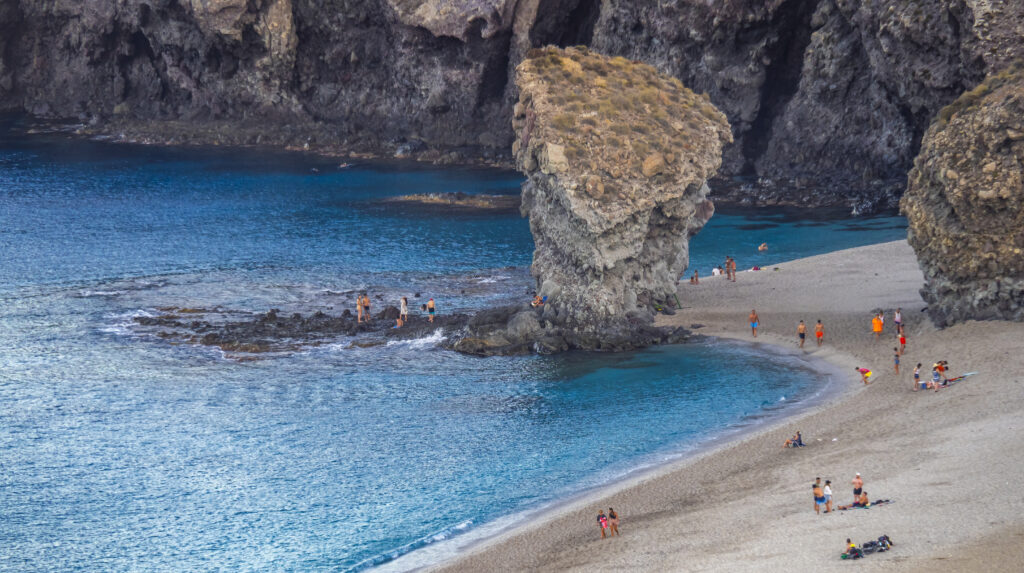
Beach of Los Muertos, Cabo de Gata-Níjar Natural Park, UNESCO Biosphere Reserve, Hot Desert Climate Region, Almería, Andalucía, Spain, Europe
Homeownership in Spain
Homeownership in Spain is very high vs other European countries. Owning a property is considered an important goal for many Spaniards, and it is seen as a sign of stability and financial security. According to statistics, around 78% of households in Spain were homeowners as of 2021. This means that there are fewer rental properties on the market and maybe a lower turnover as well on properties. To compare with other European countries: Italy has homeownership above 70% and France and United Kingdom are above 60% while Germany is just above 50%.
It is worth noting that the homeownership rate varies across different regions of Spain. In urban areas and larger cities, such as Madrid and Barcelona, there is a higher prevalence of renting due to factors like higher property prices and a more transient population. On the other hand, in rural areas and smaller towns, homeownership rates tend to be higher.
Overall, while homeownership remains a popular choice in Spain, renting is also common, particularly among younger generations and those living in urban areas. The decision to buy or rent a property depends on individual circumstances, financial considerations, and personal preferences.
Should you buy or rent property in Spain?
Deciding whether to buy or rent property in Spain involves considering various economic factors, including the level of income, interest rates, rental prices and the general economic situation. Here’s a breakdown of how these factors can influence your decision:
Level of Income: The level of income is a crucial factor in determining whether buying or renting is more feasible. Generally, higher income levels provide more flexibility and affordability for purchasing a property.
Interest Rates: Interest rates play a significant role in the affordability of buying a property. When interest rates are low, borrowing costs decrease, making mortgages more affordable. If interest rates are low in Spain, it can be advantageous to buy since you can secure a favourable mortgage rate, potentially resulting in lower monthly mortgage payments compared to high rental prices. On the other hand, if interest rates are high, renting may be a more financially reasonable option as it avoids taking on a mortgage with unfavourable borrowing costs.
Rental Prices: Rental prices in Spain vary depending on the region, property type, and demand. Comparing rental prices to the cost of buying a similar property is essential.
General economic situation: Is your job stable? Are property prices expensive or not at a nationwide level? Vs international cities? Is the economy growing? What about inflation?
Ultimately, the decision to buy or rent in Spain depends on personal circumstances, financial stability, long-term plans, lifestyle preferences and the economy in general. It is always wise to discuss this further with financial and real estate advisors.
Don’t worry there are bank properties for all budgets in Spain. If you are on a tight budget, we give you direct access to Spanish bank properties.
Short-term (holiday) lets
Before buying a property, you can rent a property. Each Spanish region has its own regulation on short-term rentals. So, if you want to invest in a property for short-term rentals, it is wise to double-check with a legal advisor.
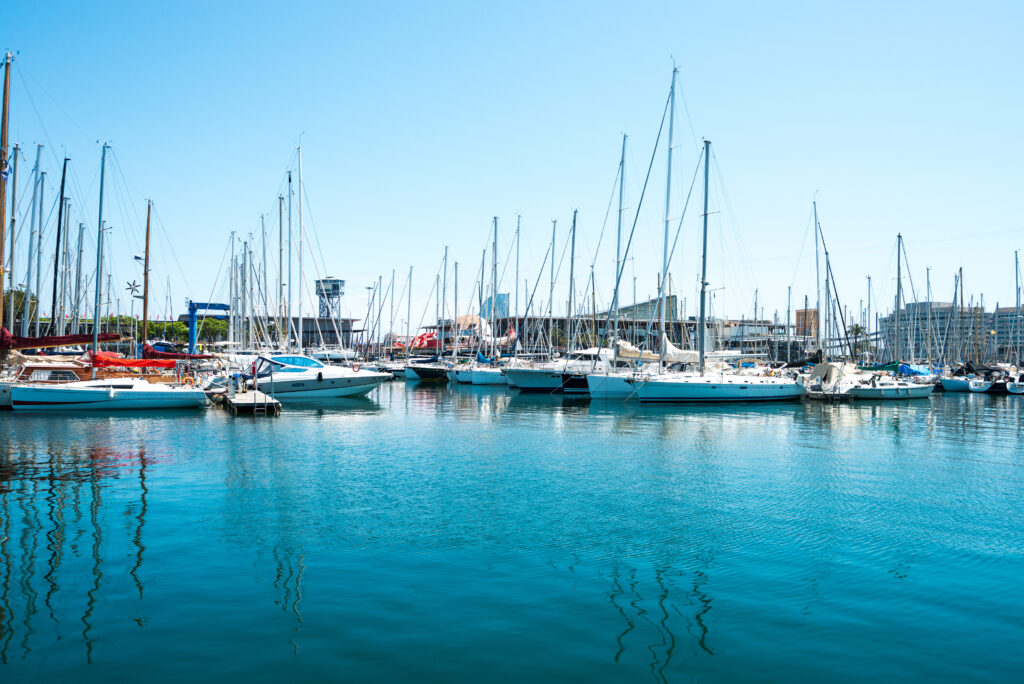
Yacht berth in Barcelona. Spain
#4 How can I find my dream property in Spain?
What is your ideal property?
Buying property in Spain alone
We wrote a detailed guide on that with different sections helping you to find your ideal home in Spain, whatever your goal is: relocation, remote working, investment, second home, retiring to Spain… We have you covered.
Here is the link to this major study: Our ultimate guide to buying your property in Spain if you want to start your property search in Spain
Here is what you will learn in our detailed study:
- The article is a guide for foreigners buying property in Spain, leveraging the authors’ expertise and network.
- Spain is a top property investment destination due to its climate, lifestyle, and affordable prices.
- The guide answers questions about the property buying process in Spain.
- It recommends working with local experts as property hunters, and technical advisors, and obtaining an NIE (local tax number).
- To avoid pitfalls, the guide suggests hiring a real estate lawyer for legal aspects.
- It lists the different criteria you should use to compare the different potential properties and avoid an emotional decision.
- It outlines the process for starting a property search, including setting objectives, budget, and home criteria.
That study is followed up by four detailed articles so that you get all your answers and all our tips before going after your dream property: You will start with this one: How should you start your Spanish property search?
Once you will find a few properties that are meeting your criteria, you will need to compare those.
Property Purchaser’s checklist
In this article, The best search tips for buying your Spanish property we have created a dedicated checklist for each buyer profile: second home, relocate, investment property, retire in Spain. With those downloadable pdf, you will be able to compare your top properties by all the different persons involved in this project thanks to useful criteria and a perfect ranking system taking emotions out of the decision.
On top of that, we give you all the most important criteria according to us each real estate use: second home, investment property, relocate, retire,…
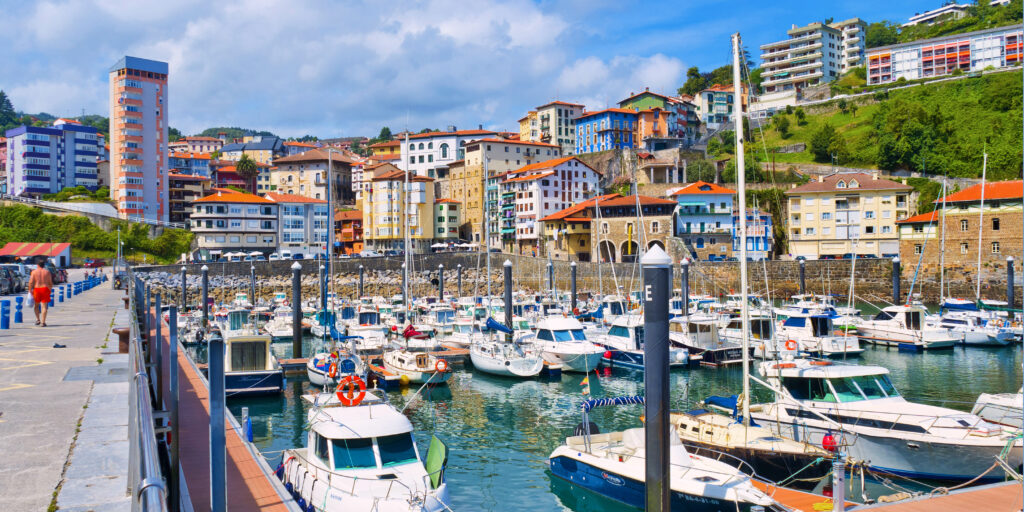
Fishing Port, Mutriku Harbour, Old Town, Mutriku, Guipúzcoa, Basque Country, Spain, Europe
How to compare and rank different properties to make the best choice?
Use our ranking system for comparing your future Spanish homes
Ranking your property according to criteria will allow you three main objectives
- remove emotions
- help you to compare properties
- allow you to discuss and compare properties with your partner(s)
The idea is simple: to create a weighted matrix containing the physical characteristics (pragmatic, rational) of the house, we will call them the Criteria and you will give each of them an importance level (personal, irrational) or Weight. Each person involved with the project should do the same.
Listing those locations and property CRITERIA in a table will help you for comparing the different properties visited by giving them a global score.
The CRITERIA are rational and shouldn’t take into account your personal feelings (unless for one). They are listed beforehand by all the parties involved in the form of an exhaustive list of each of their criteria.
#5 Finding the perfect property with a local property hunter
It is very wise to work with local property finder as you can see, there are many benefits of working with a property hunter:
- Market Knowledge: Property finders have extensive knowledge of the market, prevailing prices, neighbourhoods, and reliable partners.
- Cost Savings: A property finder negotiates the best deal for you, potentially saving you a significant amount of money.
- Time Savings: Property finders search the market on your behalf, saving you time and effort. They have contacts and can make multiple visits in a day.
- Protection of Interests: Property finders work for the buyer, ensuring their interests are protected throughout the buying process.
- Language Assistance: Property finders speak both Spanish and your language, bridging the communication gap and facilitating the process.
- Post-Purchase Support: Property finders assist with tasks like opening utility meters, contacting property owners, paying taxes, and finding local partners for renovations or property management.
Using a property finder streamlines the property search process, saves time and money, provides market expertise, and offers support throughout the entire buying process.
Find a local property hunter in our network and read more on that here.
#6 Don’t forget the legal adviser
Buying a property in Spain alone is perfectly fine, but we always strongly advise working with a real estate lawyer as we wrote in our article. If we should cite only one reason, the lawyer will make sure that your property purchase is watertight as the notary is not legally obliged to check different potential issues with the property.

Seascape from Peña Furada Viewpoint, Ortigueira, A Coruña, Galicia, Spain, Europe
#7 Buying a new-build home in Spain
When considering the purchase of a new build property, Spain offers three significant advantages. Firstly, Spain stands as Europe’s leading source for a wide range of high-quality materials, including tiles. Secondly, the cost of labour is reasonably affordable. Lastly, the country’s expansive size and extensive coastline make it an ideal location for development, offering abundant plots for construction projects.
Discover the best new build projects in Spain available right now
#8 Moving into your Spanish property
Our checklist for a new property owner in Spain
Yes, you did it, you bought your property. Now, you have some easier task to set up like opening utilities and so on…
The 18 things to do as a new property owner in Spain

Barcelona City in Spain seem from the air, showing the impressive architecture and block systems of the apartments and offices in the busy Spanish metropolis
Cost of Owning a home in Spain
Of course, a property is an investment and it means that you have costs for the property. We calculated for an apartment in Barcelona that costs are between 0.5% and 1% of the property price on a yearly basis.
Does it cost a lot as an owner of a Spanish property? Check our paper: “The cost of owning a property in Spain“.
Yes of course you got it… Taxes again: What taxes do you have to pay on your Spanish property?
#9 The 9 Steps to buying your Spanish property
In order to complete this review on the buying process of your property in Spain, in this section, you will have a closer look at all the different practical steps before you become an owner in Spain.
if you prefer, listen to our 2 min 30 seconds Video on the 9 steps to buying your Spanish property:
-
Get your NIE “Número de Identificación de Extranjeros”
It is a unique tax identification number in Spain for anyone who isn’t a Spanish citizen. You will need your own NIE number to purchase property and pay the necessary taxes! So it’s wise to apply for this as soon as you start looking for properties.
You can get it in person or via a third party. You can get it in Spain or in your home country at a Spanish Consulate. You need to ask one for your spouse as well if you buy together.
Read our article on this: “Your ultimate guide to your NIE number“.
-
Find a lawyer speaking your language and Spanish
Your first step will be to find a reliable independent lawyer who is specialized in Spanish land and property law. Unless you speak fluent Spanish, you should find a lawyer speaking your mother tongue. More on that here: What is the legal due diligence for your Spanish property?
Looking for a property lawyer in Spain? Check all our partners here!
-
Open a Bank account
With your NIE and all your documents, it is easy to open a bank account in Spain. Pay attention if you are buying from outside the Eurozone. Your local bank could charge high costs to convert your local currency into Euros or wire funds to Spain. We found a good partner to assist you in a cost-efficient manner, read our detailed paper for more on that: How to pay for your Spanish property in Euros – € while you live in a non-Euro country?
-
Do you need a mortgage?
If the answer is yes, it’s time to start working on it. You can get a mortgage either
- from your home country
- or from Spain
Ask for a mortgage from one of our partner
Read our step-by-step article with all the information you need: Your Spanish Mortgage: How to apply? How to get the best rates?
-
Sign the “contrato de Reserva”
The “contrato de Reserva” expresses your intent to purchase and remove the property from the market, it is the reservation contract. In general, you will need to pay a holding fee of €3000 to 6000. Funds are held in escrow for 14 to 21 days and you have the time to do checks on the property during that period. At the same time, a purchase contract will be drawn up and legal checks carried out.
=> This contract is very important, don’t sign without including provisions so you can exit the contract.
=> Cash ideally held by a reliable third party
-
Important checks of the property with experts
- the land registry, « Registro de la Propriedad»
- the appropriate planning permission has been obtained
- No outstanding debts attached to the property
- the Community of owners documents’
- the property is as described and structurally sound
Looking for an expert in Spain? Ask us directly!
-
Get your mortgage confirmed
Have a look at our reports on this subject:
-
Sign the “contrato de Arras”
It is the private purchase contract called as well “Contrato Privado de Compraventa”.
You will need to pay your deposit of 10% of the property within 10 days.
As soon as the necessary legal checks have taken place, you will be required to sign the private purchase contract which will state the full price of the property.
-
Go to the Notary to sign the contract for the purchase of the property
At the completion stage, all parties connected with the selling and purchasing of the property must be in attendance to sign at the offices of Notaria Publica. This includes your lawyer, mortgage provider (if applicable) and the seller or their legal representative. Before signing you should ensure you have a thorough understanding of all the costs involved and have sufficient funds to cover payments, fees and taxes.
Now that you know all the different steps, let us help you with how to do it in an easy way.
#10 Useful resources
For further reading:
- How to buy a property in Spain as a foreigner?
- The cost of buying a property in Spain.
- The 7 pitfalls of buying a property in Spain
- What return will you make on your Spanish property?
- Spanish mortgage rates for non resident
- Guidance written by the British foreign office
- You can find interesting information on this subject on the site of the notaries in Spain.
Here are our FREE pdf property buyers’ guides written for all the foreign nationalities looking to buy in Spain:
Click on your country flag, you will find your pdf report at the end of each article. Get most of our tips there.
Stéphane
Senior analyst and strategist at HTBIS
Stéphane, with over 20 years of experience in real estate, finance and entrepreneurship, is the co-founder of www.howtobuyinspain.com. With an extensive network of local partners in Spain, his deep commitment to the real estate sector combined with strong analytical skills and a problem-solving mentality have fueled his success. Constantly eager to learn and passionate about teaching, Stéphane believes in the power of knowledge sharing to master any subject.

